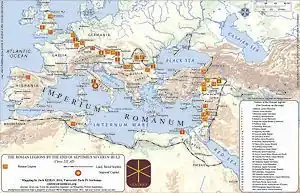

The Constitutio Antoniniana (Latin for "Constitution [or Edict] of Antoninus"), also called the Edict of Caracalla or the Antonine Constitution, was an edict issued in AD 212[1] by the Roman emperor Caracalla. It declared that all free men in the Roman Empire were to be given full Roman citizenship (and by extension all free women in the Empire were to be given the same rights as Roman women, such as the jus trium liberorum).
In the century before Caracalla, Roman citizenship had already lost much of its exclusiveness and become more available between the inhabitants throughout the different provinces of the Roman Empire and between nobles such as kings of client countries. Before the Edict, however; a significant number of provincials still were non-Roman citizens and held instead the Latin rights. Therefore, being a Roman citizen remained a well sought-after status till 212.[2] Veterans of the Auxilia were also granted Roman citizenship on discharge.
As a result, vast numbers of new citizens assumed the nomen Aurelius, in honour of their patron (whose full name was Marcus Aurelius Antoninus), including several emperors: seven of the eleven emperors between Gallienus and Diocletian (Claudius Gothicus, Quintillus, Probus, Carus, Carinus, Numerian and Maximian) bore the name Marcus Aurelius.[3] [4]
Dediticii
The one exclusion to the universal grant occurs in a vexed passage referring to dediticii, a class of technically free people who lacked either full Roman citizenship or Latin rights. In the Imperial era, there were three categories of dediticii: the peregrini dediticii ("foreigners under treaty") who had surrendered; peregrini who had taken up residence in the empire; and former slaves who were designated libertini qui dediticiorum numero sunt, freedmen who were counted among the dediticii because of a penal status that denied them the citizenship usually bestowed with manumission. The exclusion is most often taken to refer to the former slaves who had been treated as criminals by their master but for whatever reason were freed from ownership.[5]
Analysis
The Roman jurist Ulpian (c. 170 – 223) states in the Digest: "All persons throughout the Roman world were made Roman citizens by an edict of the Emperor Antoninus Caracalla" (D. 1.5.17).
The context of the decree is still subject to discussion. According to historian and politician Cassius Dio (c. AD 155 – c. AD 235), the main reason Caracalla passed the law was to increase the number of people available to tax. In the words of Cassius Dio: "This was the reason why he made all the people in his empire Roman citizens; nominally he was honoring them, but his real purpose was to increase his revenues by this means, inasmuch as aliens did not have to pay most of these taxes."[6] However, few of those that gained citizenship were wealthy, and while it is true that Rome was in a difficult financial situation, it is thought that this could not have been the sole purpose of the edict. Cassius Dio generally saw Caracalla as a bad, contemptible emperor.
Another goal may have been to increase the number of men able to serve in the legions, as only full citizens could serve as legionaries in the Roman army. In scholarly interpretations that agree with a model of moral degeneration as the reason for the fall of the Roman Empire, most famously the model followed by British historian Edward Gibbon, the edict came at a cost to the auxiliaries, which primarily consisted of non-citizen men.
In the analyses of more recent scholars, the Constitutio Antoniniana marks a major milestone in the provincialisation of Roman law, meaning that the gap between private law in the provinces and private law in Italia narrowed. This is because, in granting citizenship to all men in the provinces, much private law had to be re-written to conform with the law that applied to Roman citizens in Rome. To these scholars, it therefore also marks the beginning of a process by which imperial constitutions became the primary source of Roman law.[7]
Mary Beard distinguishes the history of ancient Rome up until 212 to be different to the era that follows, "effectively a new state masquerading under an old name".[8] Anthony Kaldellis says Rome went from an empire to a world and this decision would later underpin the enforcement of uniform religious belief.[9]
See also
References
- ↑ Richard Lim, "Late Antiquity," in The Edinburgh Companion to Ancient Greece and Rome (Edinburgh University Press, 2010), p. 114.
- ↑ Besson, Arnaud (2017-01-01). "Fifty Years before the Antonine Constitution: Access to Roman Citizenship and Exclusive Rights". Citizens in the Graeco-Roman World. Brill. pp. 199–220. doi:10.1163/9789004352612_010. ISBN 978-90-04-35261-2.
- ↑ Salway, p.136
- ↑ Blanco-Pérez, A. (2016). "Nomenclature and Dating in Roman Asia Minor: (M.) Aurelius/a and the 3rd Century AD." Zeitschrift Für Papyrologie Und Epigraphik, 199, 271–293. http://www.jstor.org/stable/26603724
- ↑ Herbert W. Benario, "The Dediticii of the Constitutio Antoniniana," pp. 188–189, 191.
- ↑ Cassius Dio, Roman History, book 78, chapter 9.
- ↑ Caroline Humfress (2013). "Laws' Empire: Roman Universalism and Legal Practice". In du Plessis, Paul (ed.). New Frontiers: Law and Society in the Roman. Edinburgh: Edinburgh University Press. p. 87. ISBN 9780748668175.
- ↑ Beard, Mary (2015-10-20). SPQR: A History of Ancient Rome. Profile. p. 530. ISBN 978-1-84765-441-0.
- ↑ Kaldellis, Anthony (November 2023). The New Roman Empire: A History of Byzantium. Oxford University Press. pp. 20, 66, 71. ISBN 978-0-19-754935-3.